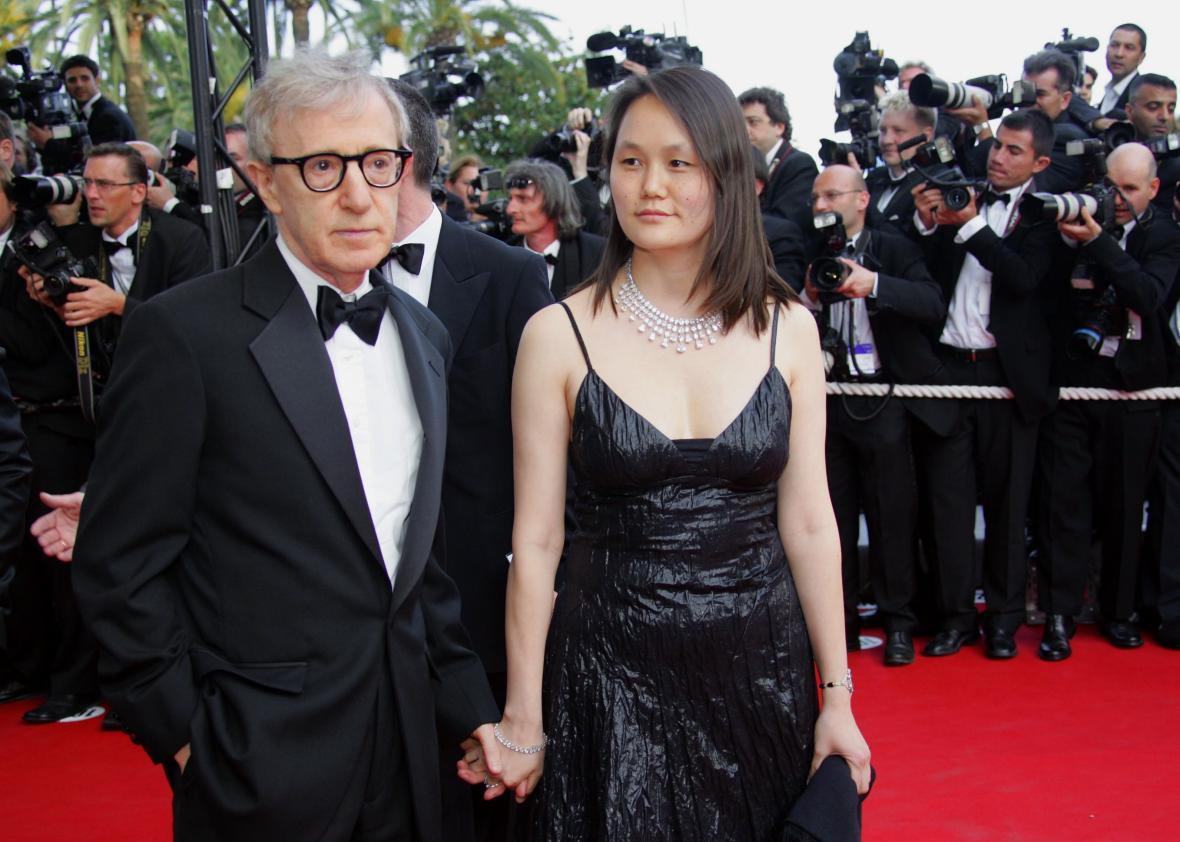From the public’s perspective, Woody Allen’s 20-year marriage to Soon-Yi Previn has always been veiled in a shroud of skepticism. Their love began under inauspicious circumstances, as a secret affair during Allen’s 12-year relationship with Mia Farrow. The couple’s 35-year age difference—Previn was college-aged when she started dating Allen, who was in his late 50s—might have seemed merely quirky, not sinister, had Previn not been Farrow’s adopted daughter.
Add that to persistent allegations that Allen molested his and Farrow’s then-7-year-old adopted daughter, Dylan, in 1992, and the coupling of Allen and Previn takes on a disturbing connotation. Allen hasn’t done much to counter the appearance that his conceptions of fatherhood and sexuality are pathologically intertwined. In an interview with NPR last July, he explained his union with Previn thusly:
I was paternal. She responded to someone paternal. I liked her youth and energy. She deferred to me, and I was happy to give her an enormous amount of decision-making just as a gift and let her take charge of so many things. She flourished.
Husbands don’t typically “give” their wives autonomous decision-making power—that’s something parents give to children, step by step, by doing things like letting them pick which flavor of ice cream to buy if they get all A’s at school. Allen continued his blisteringly self-unaware rumination on his marriage in an interview with Stephen Galloway, published Wednesday in the Hollywood Reporter. Galloway asked “How has your wife, Soon-Yi, changed you?” and Allen responded:
Oh, well, one of the great experiences of my life has been my wife. She had a very, very difficult upbringing in Korea: She was an orphan on the streets, living out of trash cans and starving as a 6-year-old. And she was picked up and put in an orphanage. And so I’ve been able to really make her life better. I provided her with enormous opportunities, and she has sparked to them. She’s educated herself and has tons of friends and children and got a college degree and went to graduate school, and she has traveled all over with me now. She’s very sophisticated and has been to all the great capitals of Europe. She has just become a different person. So the contributions I’ve made to her life have given me more pleasure than all my films.
First of all: Allen did not adopt Previn from Korea; Farrow and her previous husband, André Previn, did. Besides that, Allen’s account of Previn’s life is troublingly colonialist. He plucked Previn from the squalid streets of a third-world country to give her a proper education, he says, one that included the sophisticated capitals of the Western world. It confounds the mind to consider why a husband might boast about making his wife’s life “better” when “better” means “not starving and homeless.” To Allen, Previn has been a project, a charitable cause, a prized accomplishment—half a world away from anything like an equal partner.
Just as disturbing as Allen’s white savior complex is the fact that he talks about Previn as though she were a child—even worse, as though she were his child. He gave her opportunities to thrive, and she “sparked to them.” He thrills to see her making friends, as if her capacity for independent social engagement is a lovely surprise. He applauds her burgeoning intellect, nurtured as it was by the tutelage of his learned hand. He’s proud, in other words, of the way he raised her.
It’s always best to give consenting adults the benefit of the doubt; if a romantic pairing seems unlikely because of a vast difference of age or disposition, who cares? No one outside the relationship knows what it’s truly like, and as Allen has said to justify his relationship with Previn, “the heart wants what it wants.” Even a couple as inconceivable as Melania and Donald Trump—the latter of whom so scarcely considers his wife a real human being that he prefers to believe she never poops or farts—must have their reasons for continuing their partnership.
This Hollywood Reporter interview makes it very, very hard to give Allen and Previn the benefit of the doubt. After Allen waxed on about how proud he was to have turned his wife of 20 years into a “different person,” Galloway called him out on his avoidance of the question: “You’re saying how you changed her; how has she changed you?” Allen’s answer sounds a lot like something Trump himself would say when asked to describe a woman in his life: “Well, she’s given me a lot of pleasure. … She has given me a stable and wonderful home life and great companionship.”
Before Allen explained how he magically transformed Previn from a helpless orphan into a stable, semi-autonomous homemaker, Galloway brought up the public criticism Allen faced when his affair with Previn came out in the ‘90s. “Were you immune to all that? Were you unaware of it?” he asked. Allen’s response wa characteristically arrogant:
I was immune, yes I was. You can see I worked right through that, undiminished. Made films all through those years and at the same rate I was making them. I’m good that way. I am very disciplined and very monomaniacal and compartmentalized.
The more we learn about Allen, the more glimpses he allows us into his psyche, the harder it is to believe that his career has continued unscathed. Lucky for Allen, the film industry and its admirers share his talent for compartmentalization.
